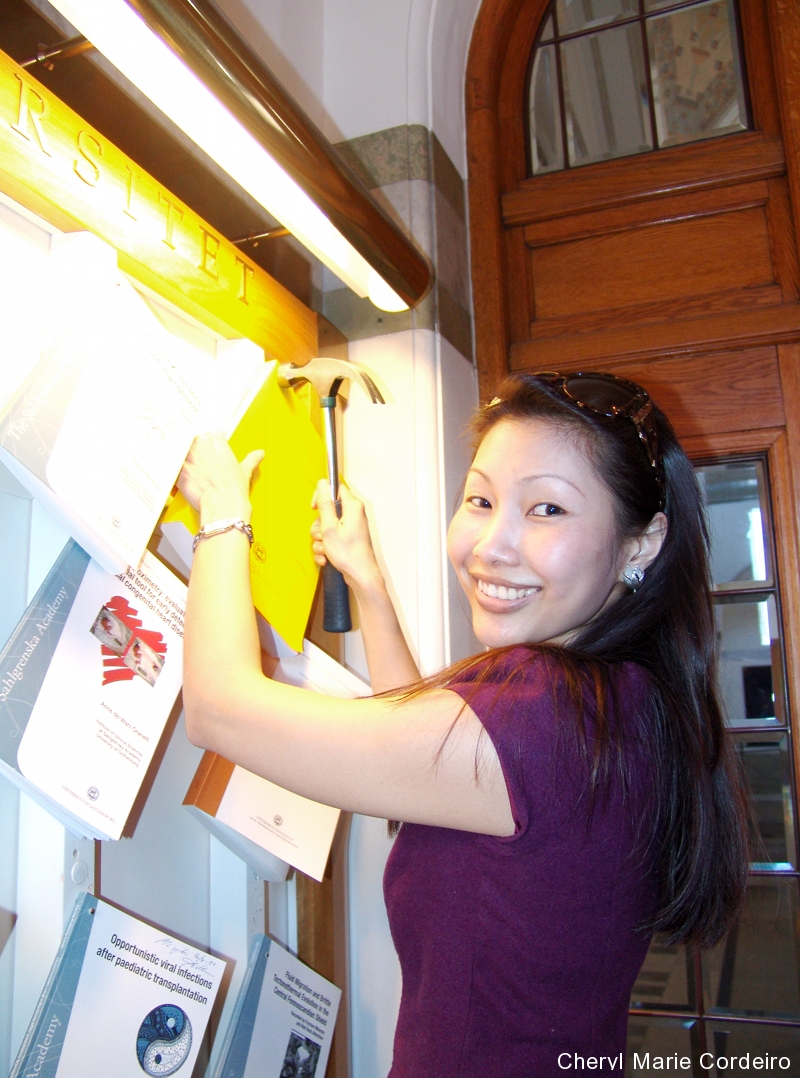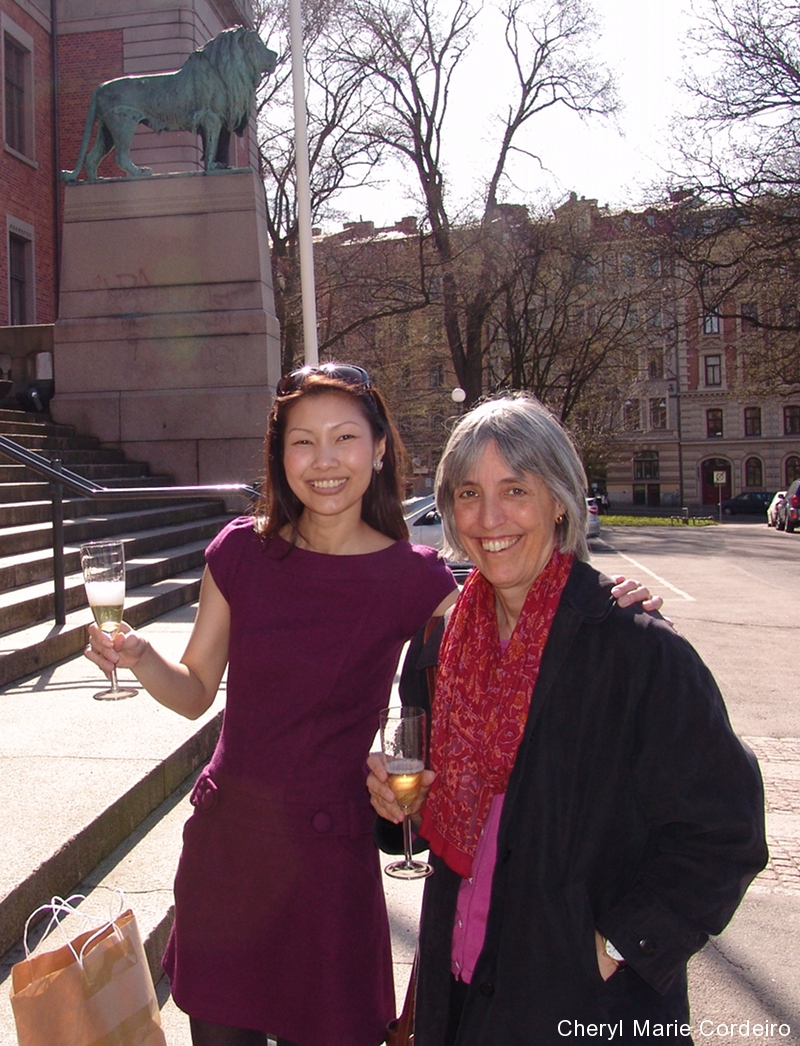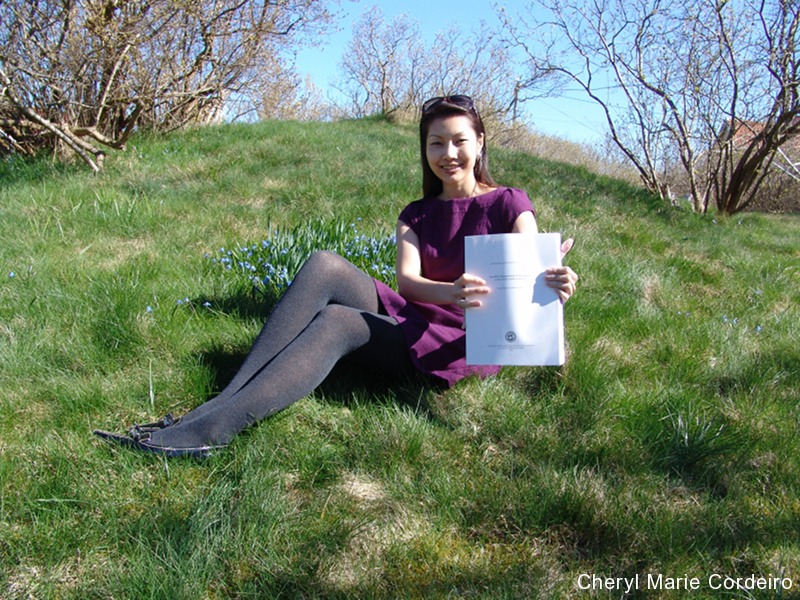Sitting in the garden at home at Styrsö, after the small ceremony of having nailed my thesis to the wall at the main administration building of the University of Gothenburg, Sweden.
I’m wearing a Purple wool dress by Warehouse and black patent flats by Prada.
Text & Photo © JE Nilsson, CM Cordeiro-Nilsson, Sweden 2009
It was to be a small academic ceremony today where I collected my thesis from the printers and have one copy nailed to the public notice board of the University of Gothenburg. The spikning or the nailing of the thesis is for two main reasons, the first of which is to encourage the public to read your work and the second, perhaps more important reason, is to show that your work is not the result of plagiarism.
I don’t think I could have accomplished this PhD journey without mentors. And the question of mentoring and how much that influences students is certainly a topic of higher education pedagogic research. I recently read an article on the importance of graduate students having mentors in their training. In a study by Paglis, Green and Bauer (2006), it was found that the perceived benefits of mentoring had longitudinal positive effects for graduate students. Students were found to rolemodel their mentors, turned to their mentors for guidance and support outside of the thesis writing process, they had enhanced self-confidence and turned to their mentors in career advice (Luna & Cullen, 1998). Research productivity and publication success also seemed to be influenced by mentoring (Green, 1991; Cronan-Hillix et al., 1986). I have during my doctoral students years, been fortunate enough to work with several distinguished individuals, professors in their field study, whom I would certainly consider to be my mentors. For main supervisor to my thesis work, I have had Sally Boyd, who is Professor of Sociolinguistics and Dean of the Faculty of Humanities at the University of Gothenburg. Her constant support is memorable, her feedbak to every chapter produced challenged me to take my critical thinking further. Joseph Foley, Professor of Linguistics at Asssumption University in Thailand is second supervisor to my thesis. He was formerly Head of Department at the English Language and Literature Department at the National University of Singapore. He was supervisor and mentor to me during my Honours thesis and Master thesis writing years. It was through his lectures and tutorial sessions that ignited in me, an immense curiosity for systemic functional linguistics (SFL, M A K Halliday’s work that began from the 1960s) as theory and framework for meta-language analysis. World Englishes is also Joe Foley’s expertise, and I continue till today, to be interested in global and international Englishes.
The topic of research for my PhD thesis was Swedish management in Asia, focusing in particular, the study of Swedish managers working in Swedish owned / managed companies in Singapore. I was put in touch with Sten Jönsson, Professor of Organization Management at the Gothenburg Research Institute (GRI) and for some years, under Sten’s tutorship and mentorship, spent time at GRI as associate doctoral student, socializing with scholars researching Nordic Integration (INNOM). INNOM is a project that studied the business integration processes of companies located in Scandinavia. My own PhD thesis would do a comparative study on Scandinavian management outisde of Scandinavia. In that sense, I appreciated the network and shared seminar series, being able to leverage on the sharing of knowledge.

Nailing the thesis to the public notice board at Göteborgs Universitet.
The ceremony consisted of drilling a hole at the corner of my 554 paged thesis and putting a nail through that, onto the notice board at the University of Gothenburg. A champagne bottle was popped and served in celebration, and as a thank you for the group who had joined in for this happy event.

At the main administration building of the University of Gothenburg, Vasaparken. I stand next to my supervisor, Sally Boyd, who is Professor in Sociolinguistics and Dean of Humanities at the University of Gothenburg, Sweden.
Personally, I think becoming embedded in a social network relevant to your subject of research interest, the process of socializing that can result in joint-publications, and being generally educated into academia as career has very much to do with mentorship help along the way. And I am thus far grateful for the help and influences that has now led to this little ceremony of a spikning proper on 17 April 2009 at Vasaparken, University of Gothenburg, Sweden.
References
Cronan-Hillix, T., Gensheimer, L. K., Cronan-Hillix, W. A., and Davidson, W. S. (1986). Students’ views of mentors in psychology graduate training. Teaching of Psychology 13(3): 123–127.
Green, S. G. (1991). Professional entry and the adviser relationship: Socialization, commitment, and productivity. Group & Organization Studies, 16(4): 387–407.
Luna, G., and Cullen, D. (1998). Do graduate students need mentoring? College Student Journal 32(3): 322–330.
Paglis, L., Green, L., & Bauer, S. (2006). Does adviser mentoring add value? A longitudinal study of mentoring and doctoral student outcomes. Research in Higher Education, 47(4), 451-476.
